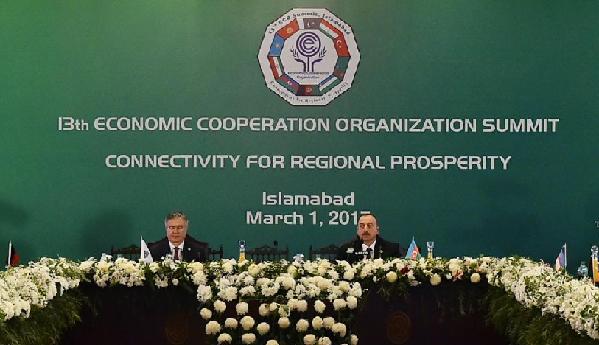The B&R and regional ECO summit
china.org.cn / chinagate.cn by Sajjad Malik, March 3, 2017 Adjust font size:
|
|
|
The 13th summit of the Economic Cooperation Organization (ECO) is held in Pakistani capital Islamabad on March 1. |
The mega "Belt and Road (B&R)" initiative is catching global attention faster than many people had expected. Interestingly, it was mentioned both directly and indirectly at the 13th summit of the Economic Cooperation Organization (ECO) held in Pakistani capital Islamabad on Wednesday.
Set up in 1985 by Pakistan, Iran and Turkey and later expanded in 1992 to include Afghanistan, Azerbaijan, Kazakhstan, Kyrgyzstan, Tajikistan, Turkmenistan, and Uzbekistan, the 10-member ECO is a formidable forum of nations with about half a billion population.
The 13th Summit was attended by presidents of Azerbaijan, Iran, Tajikistan, Turkey and Turkmenistan, Prime Minister of Kyrgyz Republic, Deputy Prime Minister of Kazakhstan, First Deputy Prime Minister of Uzbekistan and Special Envoy of the Afghan president. Pakistan's Prime Minister Nawaz Sharif chaired the meeting.
Though China is not part of the grouping, its representative, Executive Vice Foreign Minister Zhang Yesui, was invited as a special guest to address the summit. In fact, he was the only representative to address the summit as a guest speaker.
The theme of the Summit was "Connectivity for Regional Prosperity," which assumed special significance in the backdrop of monumental project of China-Pakistan Economic Corridor (CPEC) being implemented by Pakistan and China to link up the two nations through a network of infrastructure projects.
The CPEC is part of the greater Chinese dream project of Belt and Road through which China aims to link up the world for greater connectivity to facilitate trade and commercial activities.
Prime Minister Sharif was the first to refer to the B&R when he talked about the importance of the CPEC in the context of increasing connectivity among the ECO members. He said that "perhaps no project better symbolizes Pakistan's conception of win-win cooperation through connectivity, than the China-Pakistan Economic Corridor."
He also said that it was "gratifying that CPEC is now being recognized as a catalyst for energy infrastructure, transport connectivity and trade in the whole of South and Central Asia."
A day before the summit, Pakistan's advisor on foreign affairs Sartaj Aziz said at the meeting of ministers of the ECO nations that the member states can get benefit of the CPEC and can use the Gwadar seaport, which was built through Chinese assistance and now its operational control is also with China.
The CPEC in fact terminates at Gwadar, thus linking up western China with the warm waters of the Arabian Sea and through it with the Gulf, Africa and Europe.
The presence of a senior Chinese official was also reassuring that the ECO region may at some point be directly getting involved in the projects of CPEC undertaken under the ambit of B&R.
Speaking as special guest, Mr. Zhang Yesui said that the ECO will help promote China's initiative of "Belt and Road cooperation" for greater regional integration, development, and prosperity.
He also urged the ECO countries to step up strategic communication and cooperation for greater and in-depth regional cooperation. He said ECO countries have friendly ties with China in terms of cultural linkages, proximity, and old China Silk Road.
The summit was a great success as it adopted Islamabad Declaration and Vision 2025 delineating a road-map for greater regional cooperation and integration over the next 10 years.
As the ECO leaders made commitment to focus on projects to increase connectivity, it is matter of time that some of them will link up with the CPEC. In fact, the expansion of ECO in 1992 was made with an objective to provide sea access to the landlocked Central Asian states, which had won independence after the demise of the USSR.
The Gwadar port is at the end of one of the shortest route from Central Asia to the open sea. With a full operational seaport, an international airport which is being built by China as part of the CPEC projects, and industrial parks to facilitate trade, Gwadar is but natural destination of several ECO nations, which may reap the benefits of mega Chinese projects.
There are reports that Iran has already expressed desire to become part of the CPEC. There is also possibility that a multi-billion dollars gas pipeline project to provide Iranian gas to Pakistan may be further expanded to China along the CPEC route. It shows that the B&R and its related schemes offer endless possibilities for the world.
Sajjad Malik is a columnist with China.org.cn. For more information please visit:
http://www.china.org.cn/opinion/SajjadMalik.htm
Opinion articles reflect the views of their authors, not necessarily those of China.org.cn.
